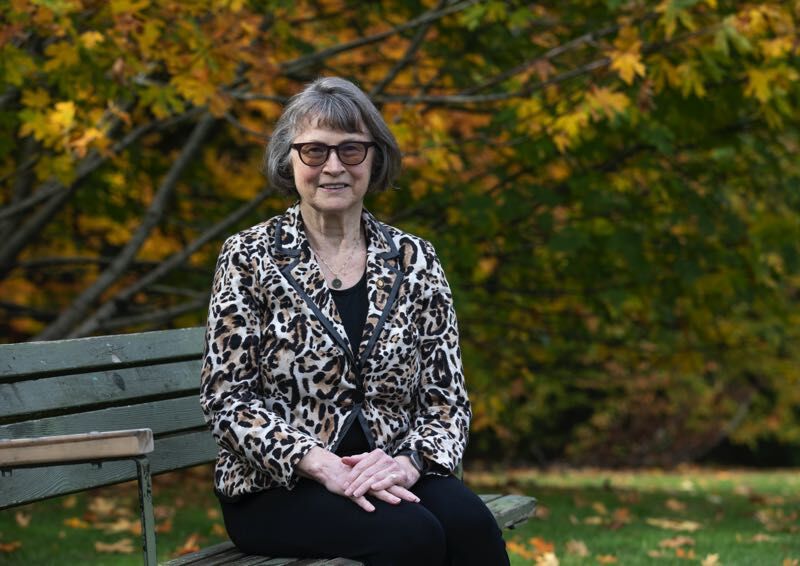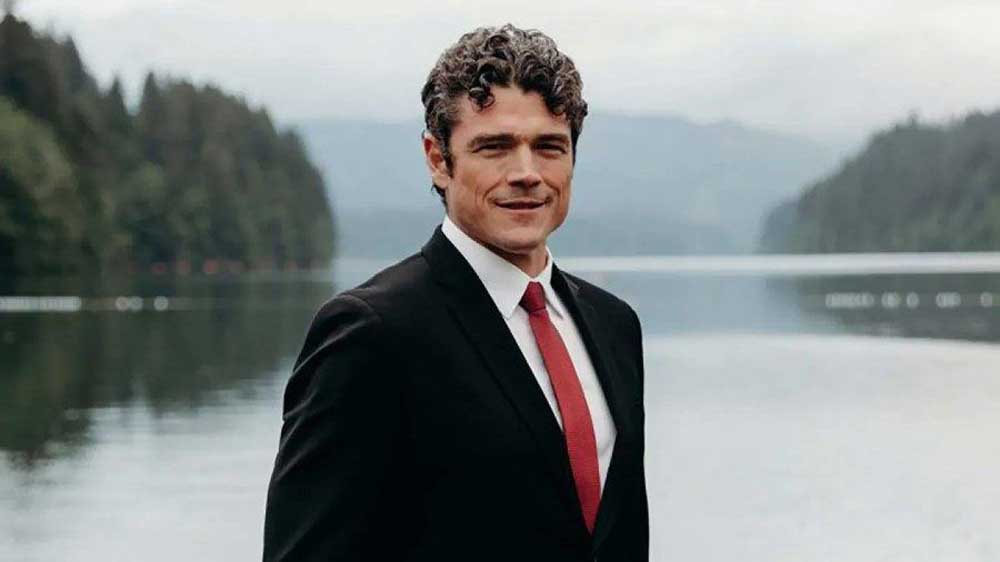From reporter to newsmaker: Portland Sen. Burdick retires
Published 11:53 am Monday, November 1, 2021

- Ginny Burdick
Ginny Burdick started reporting the news in 1973.
Nearly a half century later, Burdick has been making the news for 25 years as a state senator — she is the longest-tenured woman in the Oregon Senate, though Mae Yih of Albany served a total of 26 years counting House service — and an outspoken advocate of firearms regulation that earned her an F-minus grade from the National Rifle Association.
Trending
She left the Senate Monday to be one of Oregon’s two members of the Northwest Power and Conservation Council. The Senate confirmed her appointment by Gov. Kate Brown on May 13 for a term ending in January 2024.
Burdick, who turns 74 in December, graduated from Wilson High School (now named for Ida B. Wells) in 1965 and the University of Puget Sound in 1969.
When she was at the University of Oregon, she chose her master’s project in journalism.
“I think I was the first reporter to cover the lobby as an entity,” she recalled. “I decided to focus on them and the influence they have on the Legislature. It was a great way to get started.”
Starting in Salem
The 1973 session is regarded as one of the most seminal in Oregon history. In addition to Oregon’s first laws regulating lobbyists and requiring financial disclosures by officials, lawmakers also passed open meetings and public records laws, decriminalization of possession of small amounts of marijuana, statewide standards for city and county land use plans, and more.
Trending
“It was a pretty exciting time to be in Salem in the 1970s,” she said.
Her project was published by the Eugene Register-Guard — it took up two full pages — and a condensed version was distributed by the Associated Press news service. She ended up working for the Portland bureau of the Associated Press in 1974.
“I really wanted to cover Salem. But it was a plum job and I was the junior person in the bureau, so my chances were exactly zero,” she said. “I knew if an opening came up, I’d want to be prepared.”
Burdick learned how to operate the teletype machines then in use at the news services. In addition to writing a lot — faster and in greater volume than she ever did for the newspaper — it helped her gain a Salem reporting position during the 1975 session.
One day she wrote 10 original stories, including a story about a 500-page report on energy, all before noon. “It was high pressure,” she said. “But it was very exciting. I really loved it.”
When the session ended, she returned to the Portland bureau. But then she caught the Washington, D.C., bug, and moved there without a job in 1976.
“It was the epicenter of politics,” she said. “But after five years and four jobs, it got to be boring, because it’s such a company town, even though it was exciting when I was there.”
She moved to Los Angeles, where she was environmental issues manager for Atlantic Richfield Co. for three years, when she was one of a handful of top-ranking women in a corporation with 55,000 employees. She returned to Portland in 1984. She worked for Gard and Gerber, now Gard Communications, and opened her own firm.
Though she retained her interest in environmental and energy issues, she began to broaden her interests. She was issues manager, then spokeswoman for Neil Goldschmidt’s winning bid for governor in 1986. She did not seek a full-time position in state government, but she was appointed in 1987 to the Land Conservation and Development Commission and served until 1993.
“It was an evolution,” she said. “I decided that maybe it was time I tried it for myself.”
‘Third rail of politics’
Burdick’s first run for the Oregon Senate in 1988 challenged Democrat Jan Wyers, who had edged a Republican for his third term four years earlier. But Wyers dropped out, and four-term Rep. Dick Springer emerged as the party nominee with 38%; Burdick was the runner-up. Dan Saltzman, later elected a Multnomah County commissioner and Portland city commissioner, was third.
Eight years later, Springer chose not to run again. By then, Burdick had formed her own crisis consulting firm — she had helped Elizabeth Furse in her 1992 victory for the U.S. House and John Kitzhaber in his 1994 victory for governor — and had a daughter.
“Having my own business with the flexibility of working and getting into political campaigns was very satisfying,” she said. “I looked at the field of candidates in the Senate race and I thought I would be a better fit for the district. But I didn’t have the endorsements that any Democrat needs to have in a Democratic primary,”
The leading candidate was Frank Dixon, a lawyer and a future chairman of the Democratic Party of Oregon, who had already amassed endorsements from then-Mayor Vera Katz and others.
When Burdick proposed to take up advocacy of criminal background checks for purchasers at gun shows as a key campaign issue, some of her supporters told her it would cost her the primary. She decided to test it in door-to-door campaigning — and even she was surprised by the positive response she drew.
“Everybody was afraid of the National Rifle Association, and Oregon has a high rate of gun ownership,” she said. “So it was always seen as a third rail of politics.
“But because of that issue and people were ready for someone to try to do something about the gun violence we were all experiencing, I won that primary in a landslide, even though I’d like to think it was my personality,” she said.
She won with 46.2%, Dixon 31.4%, former Rep. Tom Mason, who lost his House seat two years earlier, 16.8%, and Kent Snyder, 5.3%.
She won the general election with 62.1% in a heavily Democratic district, her lowest total in seven elections. She was unopposed in three of those elections, including 2020. The Southwest Portland district was redrawn in 2001 to extend into Tigard and Washington County, and in 2011, into a sliver of Clackamas County.
Burdick made a bid for Portland city commissioner in 2006 — she was recruited as a pro-business candidate — but 10-year incumbent Erik Sten won a bare majority to avoid a runoff against Burdick.
“Looking back, I am glad that I lost,” she said. “Much of what I did in the Senate — what was most rewarding as my public service — happened after that race.”
‘The right thing to do’
When Burdick was seated in 1997, she was one of just 10 Democrats in the chamber — the party’s lowest total since 1955 — but one of four new Democratic women. The others: Kate Brown and Avel Gordly, both of Portland, and Susan Castillo of Eugene. Brown became secretary of state and governor; Castillo, the last elected state schools chief.
Burdick promptly proposed background checks at gun shows, but her bill did not get a hearing, despite support from newspaper editorials. “I just kept chipping away at the issue and trying to get outside support,” she said.
Two years later — after the 1998 shootings by Kip Kinkel that resulted in the death of two students and the wounding of 25 others at Thurston High School in Springfield and the murder of Kinkel’s parents — she was ready to give it another try.
Republicans still were in the majority. But the chairman of the Senate committee that Burdick herself would lead years later told her he would advance a bill if she kept it narrowly focused. The Senate passed it with a bare majority of 16 votes, including that of Republican Brady Adams of Grants Pass, the Senate president.
Adams took political flak for his vote in his largely rural district, and Burdick apologized to him for it. “He told me simply it was the right thing to do, and he would do it again,” Burdick recalled.
But the bill never emerged from the Republican-controlled House. Burdick then led a petition drive to qualify it for the general election ballot in 2000, when it passed with a 62% majority, including 24 of Oregon’s 30 Senate districts.
Burdick kept “chipping away” over the next 21 years.
In 2017, lawmakers approved legislation — known as a red-flag law — allowing family members, household partners or police to seek court orders to keep firearms out of the hands of someone at “extreme risk” of suicide or harming others.
In 2018, lawmakers closed the so-called boyfriend loophole that allowed some convicted of domestic-violence misdemeanors to possess firearms, even when the victims were members of the family or household.
In 2021, lawmakers approved requirements for safe storage of firearms and a ban on firearms at the Capitol in Salem and the public terminal at Portland International Airport. Governing boards have the option of banning guns from public schools, community colleges and universities.
The final ban was less extensive than in the Senate’s original bill. But Burdick said other champions have emerged in the Legislature.
“The Legislature, both Democrats and Republicans, was completely out of touch with how the public felt on gun violence issues. I just happened to tap into that,” she said. “That’s why I felt it was part of my duty as a public servant to keep on with that issue through my public career. And I did.”
Other issues
As leader of the Senate Judiciary Committee in 2005, she worked with a bipartisan group to put together measures aimed at stemming Oregon’s methamphetamine epidemic. The most controversial measure, which lawmakers repealed this year, was a requirement for a prescription to obtain products with pseudoephedrine — a common ingredient in nasal congestion medicines, but also a chemical precursor in methamphetamine.
Drugmakers had urged lawmakers simply to keep such medicines behind the counter and make them available with photo identification. But Burdick and other key lawmakers decided to test how readily available the medicines were during a shopping trip to big retailers in Salem.
“Some stores had limits on how much we could buy of those pills; some had no limits,” she said. “But in one hour, we had purchased our legal limit of nine grams. We could have gotten a lot more. We knew that prescriptions were needed if we really wanted to address the problem.”
Although homegrown meth labs have virtually disappeared from Oregon as a result, they have been supplanted by shipments of the illegal stimulant made in Mexico.
The committee also passed the 2007 bills that bar discrimination based on sexual orientation and legalize civil unions by same-sex couples, seven years before a federal judge struck down Oregon’s ban on same-sex marriages.
As chairwoman of the Senate Finance and Revenue Committee from 2009 to 2015, and again in 2021, she worked on a host of tax issues. She actually started in 1997, when she tried to abolish Oregon’s pollution control tax credit that had been law for 30 years. Burdick said companies should not be rewarded for instituting controls they were required to have. Lawmakers finally ended it in 2007.
Two years later, lawmakers ended almost all state tax credits, which are subtracted directly from taxes owed, and put them on a six-year review schedule.
“It was a legislative miracle to end all of the tax credits in one session,” she said. “Once you give people money, they don’t want you to give it up.”
Burdick said, however, that the bulk of Oregon’s tax expenditures for the current two-year budget cycle — $26.7 billion, just under the approved state budget of $26.8 billion from tax-supported general and lottery funds — results from federal deductions such as the interest on home mortgages.
In 2013, lawmakers pared a state deduction for senior medical expenses — “low-income seniors got no benefit” — by limiting it to people 62 and older and requiring an income test. Also in that legislation was a tax break for S-corporations. But Burdick said it proved to be too generous for the largest small businesses, and the Senate took the lead this year to revise it.
“We were trying to help small businesses grow,” she said. “By scaling it back, we got it closer to its original intent.”
Her partner on the original 2013 bill, and co-leader on the 2021 revision, was Sen. Brian Boquist of Dallas, formerly a Republican and now an independent. He also was a Senate co-manager of the 2017 red-flag law. A stepson took his own life in 2016, and three men under his Army command also did so after they returned from Iraq.
Burdick said all Boquist asked of her was that they be the only two senators involved in writing and advocating those two bills, aside from staff.
“Working on a tax bill that will raise taxes for some people and working on a gun regulation bill are not things a Republican does,” she said. “He is very conservative, but he is independent. If something does not make sense to him, and he sees a pathway to fix it, he is going to do it.”
Last hurrah
Burdick was Senate president pro tempore from 2011 to 2015 — a largely ceremonial position, but who presides over the Senate when the president is absent — and majority leader for five more years, until she gave up that job in mid-2020. The majority leader is the party’s principal spokeswoman and leads the Rules Committee, which is the legislative traffic cop during the closing days of a session.
Another leadership position came unexpectedly. It was for the Senate-House committee created after voters legalized marijuana in 2014.
“It was a sought-after committee because it seemed cool, but it was not sought after by me,” Burdick said.
But Senate President Peter Courtney told Burdick she not only had to sit on the committee, she had to lead it with then-Rep. Ann Lininger of Lake Oswego. She did, but gave up leadership of the tax committee, which she reclaimed in 2021.
“It was much more involved than I thought it would be,” she said.
“It’s been decades since the Legislature made major changes in a voter-passed initiative without having to have buy-in from the chief petitioners. So that made it extra hard.”
Of the 26 bills before the committee, five cleared — including one changing the ballot measure, another substituting a tax on retail sales for the original one on growers, and a third allowing retail sales by licensed medical marijuana dispensaries. All passed the committee unanimously, and then-Senate Republican Leader Ted Ferrioli of John Day was the co-floor manager with Burdick for the three key measures.
In 2020, Tigard-Tualatin School Board member Ben Bowman challenged Burdick in the Democratic primary, but despite his lining up prominent endorsements, Burdick beat him, 69% to 31%. Bowman is now running for a newly drawn House district centered on Tigard.
In taking the Northwest Power and Conservation Council seat being vacated by Richard Devlin of Tualatin, himself a former senator, Burdick said she will return to issues that drew her into journalism and the public arena in the first place.
“It will be a change of pace. It will be much more of an immersion into policy that appeals to me,” she said. “Of course, I will always miss the Senate and what we were able to accomplish during my time there. It was just an amazing run. I feel fortunate to be part of it.”





